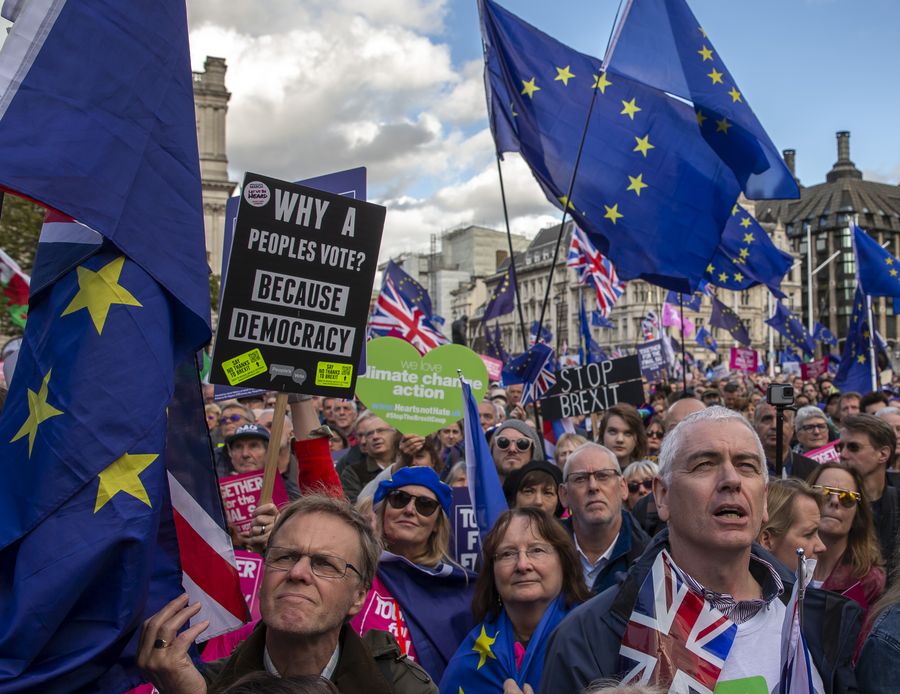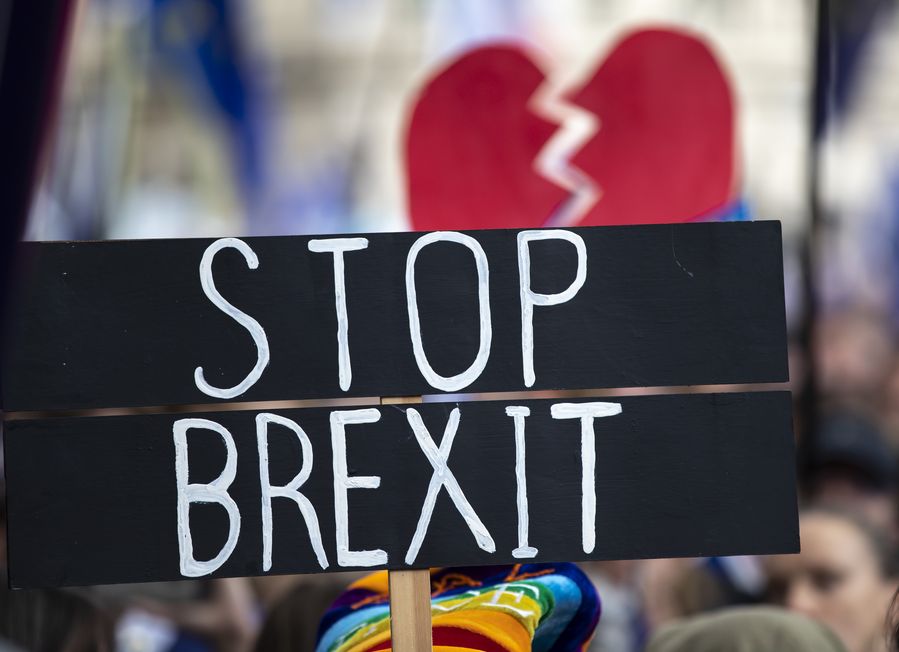
People take part in the "Together for the Final Say" event at the Parliament Square in London, Britain, on Oct. 19, 2019. (Xinhua/Han Yan)
"A hard Brexit may have a strong negative impact on the competitive position of Dutch firms, mainly in the food industry, chemicals, agriculture and retail. However, some sectors in the business services may have an improved competitive position due to Brexit," said Mark Thissen, senior researcher of economics at the PBL Netherlands Environmental Assessment Agency.
by Maria Vasileiou
THE HAGUE, Nov. 10 (Xinhua) -- Leading Dutch economy sectors, mainly agriculture, food industry and chemicals will be worse off following a hard Brexit, but the competitive position of business services will then improve, Dutch expert said recently.
"A hard Brexit may have a strong negative impact on the competitive position of Dutch firms, mainly in the food industry,chemicals, agriculture and retail. However, some sectors in the business services may have an improved competitive position due to Brexit," said Mark Thissen, senior researcher of economics at the PBL Netherlands Environmental Assessment Agency, following the findings of an extensive research on the impact of Brexit.
"Anything is still possible from a no-Brexit to a no-deal Brexit," Thissen told Xinhua in an interview, reflecting possible increased lack of certainty around Brexit following the outcome of a general election in Britain on December 12.
A hard Brexit,where the European Union (EU) and Britain do not reach an agreement, means that the World Trade Organization (WTO) rules -including tariffs- would immediately apply. This outcome will negatively affect seven Dutch economy sectors, namely agriculture, the food industry, chemicals, the furniture industry, wholesalers, retailers and land transport, the PBL research has shown.

A placard is seen during the "Together for the Final Say" event at the Parliament Square in London, Britain, on Oct. 19, 2019. (Xinhua/Han Yan)
The additional cost of import tariffs will have a major impact on the competitive position of these sectors, which export many products to Britain, explained the Dutch researcher. Britain is the Netherlands' third-largest export partner and around 8 percent of Dutch export in goods is destined for Britain.
On the contrary Dutch financial service providers, travel organizations and telecom companies might benefit from a hard Brexit. According to the PBL study the operating costs of British companies operating in the EU service market will increase after Brexit, which does not apply to their Dutch competitors, allowing them to improve their position.
The PBL also looked at the Brexit effects for individual provinces. For all provinces, a Brexit in which the WTO rules come into effect means a deterioration of their competitive position. However, the economically smaller provinces suffer more than the larger provinces.
But Zeeland, the south-westernmost and least populous province in the country, and Groningen, in the north-easternmost part of the Netherlands, have the highest exposure levels to Brexit, probably as a consequence of the energy produced in these regions.
"We also looked at the difference in the effects if the final deal will be very different from a hard Brexit," said Thissen. "The most important issue at the moment is still whether or not Brexit will happen. In case it happens the devil is in the detail for the EU. The details will determine which regions will lose the most and which regions will gain the most," the Dutch expert said, highlighting that consequences are largely dependent on the nature of the post-Brexit UK-EU trading arrangements.

A protester with his face painted in the colors of an EU flag prepares to attend the "Together for the Final Say" event at the Parliament Square in London, Britain, on Oct. 19, 2019. (Photo by Stephen Chung/Xinhua)
The terms of the deal will also determine how seriously some sectors will be affected. "Especially the effects on the food sector depend on the details of the final deal," the Dutch economist said. "However, the negotiation about these details will only start after the negotiation about the general deal. All these discussions are still to come after Brexit has happened".
According to the PBL, the Netherlands' national level of Brexit trade-related risk exposure is just over 4 percent of GDP, placing the country at the third place after Ireland with a risk exposure of over 10 percent of GDP and Germany, with just over 5 percent of GDP.
A managed Brexit that will be followed by a relatively narrow Free Trade Agreement, which is the goal of British Prime Minister Boris Johnson, may in the long-run, until 2030, cost the Dutch economy about 3 percent in lost output growth.In the period through 2023 the Dutch Court of Audit (DCA) has estimated that possible macroeconomic effects caused by Brexit to the Netherlands stand at 2.3 billion euros. (1 euro = 1.10 U.S. dollars) ■



